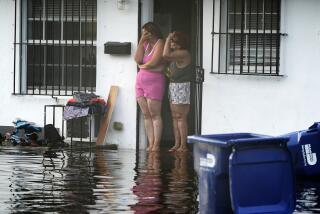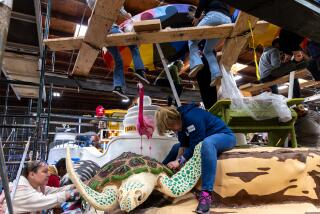Why Florida? Several Good Reasons
- Share via
MIAMI — There are the flight schools, so numerous that Florida likes to fancy itself the “aviation state.” There’s the marvelously diverse, fast-changing populace, where almost anyone can blend in.
There’s also the quick availability of driver’s licenses and state-issued identification cards, which experts say are easier to procure than library cards. And the plain truth that large amounts of cash often attract far less attention here than elsewhere.
When the hijackers who crashed airplanes into the World Trade Center and Pentagon last Tuesday needed a temporary U.S. base of operations--a place to live, learn how to operate planes and obtain documents--most chose Florida.
“It’s probably the most transient place in the United States,” said Robert Creighton, retired special agent in charge of the federal Bureau of Alcohol, Tobacco and Firearms office responsible for Florida and the Caribbean. “It’s also a center for a lot of undocumented aliens.”
State and federal court case files here are filled with evidence of fake passports, driver’s licenses, medical licenses and even video-club cards.
“You can get lost in Florida,” Creighton said.
In homes, motels, bars and airports--from Miramar northwest of Miami to Venice on the Gulf Coast--as many as 14 of the 19 Muslim men who were aboard the ill-fated airliners left a trail of rental receipts, credit card slips and other evidence now being sifted by the FBI.
In Florida, especially the areas of Miami, Fort Lauderdale and West Palm Beach, the visitors would have felt far less conspicuous than in much of the rest of the United States, said Walid Phares, professor of political science at Florida Atlantic University.
“It’s Latin here. And Latin is close to Middle Eastern,” said Phares, a native of Lebanon who has lived in Florida for 11 years. “We are all dark-skinned. If I walk on the streets of Miami, the first reaction of a Hispanic is to speak to me in Spanish.”
Muslim newcomers also would have been able to meet people of their own faith here, or perhaps already had friends or relatives in the area. South Florida is home to an estimated 30,000 Muslims--about 20,000 of whom are foreign-born. Mosques and Islamic religious centers now operate from Daytona Beach to Boca Raton.
This state, whose major economic resources are its beaches, theme parks and other attractions, is used to outsiders--and to their comings and goings. In 2000, 71 million tourists visited Florida, according to Pam Dana, director of tourism, trade and economic development. In that human flood, a few more young men wouldn’t have been much noticed.
“No. 1, it’s an international crowd,” said Bruce Udolf, a former chief federal public corruption prosecutor in South Florida. “Someone wouldn’t be as conspicuous and stand out like a sore thumb like they would in Middle America.”
The hijackers also would not have attracted much attention when they spent large wads of cash in South Florida. “Certainly, the people in South Florida are a little more jaded when seeing large amounts of cash than in other parts of the country,” Udolf said.
However, it likely was Florida’s status as a center of aviation instruction that was the chief lure for Mohamed Atta, Marwan Al-Shehhi and the other hijackers who learned how to fly here.
“We in Florida like to think we’re No. 1 [in aviation]. If we’re not No. 1, we’re a close second to California,” said Larry McGlothlin, a Panhandle-based consultant on aviation matters.
So many people, in fact, take flying lessons in the Sunshine State that officials have no way of counting them, said Department of Transportation spokesman Andy Keith. A full 20% of America’s commercial pilots earn their wings at Florida’s more than 220 flying schools. And enough weekend fliers also purchase instruction here to make it a $1-billion-a-year industry.
All 110 of Florida’s general aviation airports offer lessons, with numerous firms often competing for business. Single-plane, single-instructor outfits also serve most of Florida’s 600 private airstrips. Florida promotes itself heavily as a learn-to-fly destination, and an estimated 27% of the students are from overseas.
“You get better flying weather either in the South or out in Arizona,” said Amy Koranda, spokeswoman for the National Air Transportation Assn., which represents flying schools and other airport services. “These folks, it sounds like, were just looking for flight training, and not college credits. So they went to a place where they could fly on a daily basis.”
Paul Philip, a retired FBI agent once in charge of South Florida, agrees, dismissing the notion that this city is some sort of latter-day Casablanca of intrigue.
“Metropolitan areas in Florida are the same as everywhere else,” the 24-year FBI veteran said. “If your focus is airplanes, Florida has an awful lot of schools for pilots.”
However, temporary residency in this state would have had at least one other dividend for the terrorists: the opportunity to obtain a driver’s license or photo identity card with relative ease. That would have facilitated their travel and helped them blend in even more seamlessly with American society.
Before Tuesday’s events, a Florida grand jury already was studying how to add safeguards to the system of issuing driver’s licenses. According to assistant statewide prosecutor Tom Sadaka, Florida is the only state in the union that accepts an immigration form, known as the I-94, as the primary piece of identification for getting a license.
“The I-94 is a totally self-reported form,” meaning the foreigner, and not an immigration official, fills it out, Sadaka said. Applicants for Florida driver’s licenses also are on their honor to report their correct address. During a recent visit to one of the region’s busiest driver’s license facilities in North Miami Beach, many people were seen getting licenses without proof of residence.
To get a library card in Florida, you must prove you live where you say you do.
In the state’s 143 driver’s license bureaus, “we can’t even confirm the Social Security numbers people give us,” Sadaka complained. Now, he predicted, “there is going to be much more pressure to change our system.”
*
Times staff writer Mark Fineman contributed to this story.
More to Read
Sign up for Essential California
The most important California stories and recommendations in your inbox every morning.
You may occasionally receive promotional content from the Los Angeles Times.













